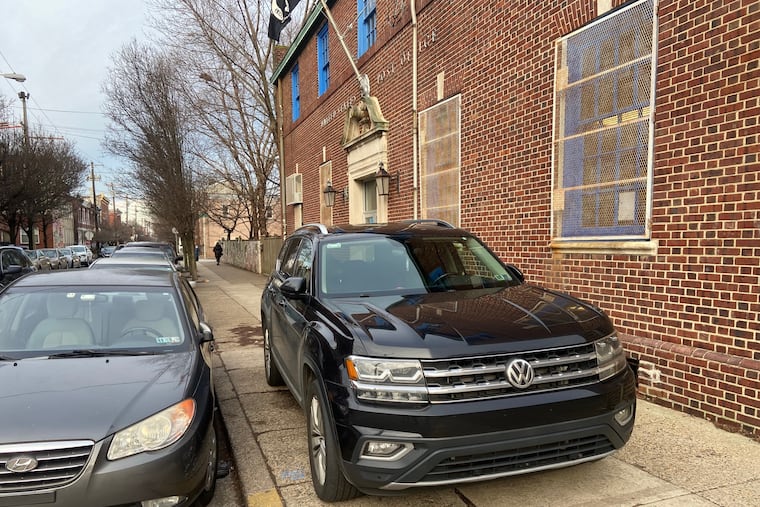To combat South Philly’s parking problem, increase fines to $300
Despite what you may have been told, parking cars in crosswalks, medians, and on sidewalks is not an endearing quality of our city.

It doesn’t take more than a few minutes of walking around South Philly to notice the sidewalk parking problem. Your walk was probably interrupted by a variety of guerrilla parking tactics, requiring you to step off the sidewalk and into the street in order to avoid a parked car.
Some characterize these Wild West parking practices as a charming part of Philadelphia culture, but is this a reputation we want to glamorize? Living within walking distance of grocery stores, restaurants, and shopping might be the single greatest part of city life. Cars parked on the sidewalk disrupt that.
These ridiculous parking jobs have become so common that we have been conditioned to believe they are normal and unavoidable, but we can fix this. The most obvious problem with sidewalk parking is that it blocks pedestrians from using the sidewalk. Walkers are forced to step off the sidewalk and into the street where cars, trucks, and cyclists are traveling. In a city that in 2017 committed to eliminating all traffic-related deaths by 2030, you’d expect pedestrian walkways and overall traffic safety to be a higher priority. In fact, the current fatality trend line is going in the opposite direction. Philadelphia saw 152 traffic deaths in 2020 and 121 in 2021, an astounding increase from the 80 traffic deaths in 2015.
» READ MORE: PPA gets rare Philly ❤️ after it starts towing cars without license plates
Even if walking around a car might not seem like a tall order for an able-bodied adult, it can be challenging for our city’s most vulnerable demographics. People over 65 years old make up 14.4% of Philadelphia’s population. For wheelchair, scooter, and wheeled shopping basket users, it is dangerous to step off the curb.
One notable contributing factor to traffic death and serious injury is the increased size of cars on the road today. Many 2023 car models are three to four inches wider than their 2005 versions, and some have grown even wider. The width of a Toyota 4Runner, for example, increased from 66.5 inches to 75.8 inches between 2000 to 2012. Sidewalks do not release a new model each year, further limiting the space for pedestrians to walk around.
It’s clear that residents do not appreciate sidewalk parking, either. They’ve taken matters into their own hands by placing decorative planters on the edge of the sidewalk to prevent cars from blocking their front steps.
How can the city address South Philly’s parking problem? By making it too expensive for drivers to continue parking on sidewalks.
The city’s $50 parking violation isn’t nearly high enough to effectively disincentivize drivers from pulling up on the curb. In 2021, District 2 in Northeast Philadelphia increased its penalty from $50 to $300, which, if implemented citywide, would pack a bigger punch. To me this is low-hanging fruit, and likely the most effective way of reducing poor parking behavior.
To be sure, finding a (legal) parking spot is frustrating and a major headache for residents and tourists alike; recently, qualified teachers have even been declining Philadelphia teaching jobs, citing parking anxiety as the primary reason. But each resident has a responsibility to maintain the public right-of-way for pedestrians.
One way to achieve Vision Zero by 2030 is to reduce the number of cars on the road, and that can only be achieved if Philadelphians have access to safe and reliable alternatives to driving. By increasing the penalty for illegal parking, some drivers will decide that owning a car in the city is more burdensome than it is useful.
Despite what you may have been told, parking cars in crosswalks, medians, and on sidewalks is not an endearing quality of our city. Parking on the sidewalk is neither safe, sustainable, nor neighborly. It’s time for us to get serious about curbing sidewalk parking and look out for all South Philly residents, not just the convenience of a few.
Matthew Cohen is a resident of South Philadelphia.